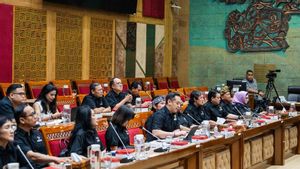JAKARTA - In the midst of the COVID-19 pandemic, the government plans to invite citizens under 45 to return to their normal activities. It is hoped that the young age group will not lose their livelihoods or avoid other viruses, namely the layoff virus.
"Of course we will give this group room to be able to do more activities. So, we can reduce the potential for exposure to layoffs, "said Doni Monardo, Chair of the Task Force for the Acceleration of Handling COVID-19, in a press conference broadcast on the YouTube account of the Presidential Secretariat on Monday, May 11.
These under 45 years of age, said Doni, are not a category of people who are easily exposed to the virus. He claims that those aged 45 and under have a fairly low mortality rate, namely 15 percent.
"Young people under 45 years of age are those who are physically fit, they have high mobility and on average, even if they are exposed, they are not necessarily sick. They have no symptoms, ”explained the Head of the National Disaster Management Agency (BNPB).
This is different from the group of people aged 65 years and over. At that age, said Doni, the risk of death reaches 45 percent.
Whereas for the 46-59 year old group, the mortality rate reaches 40 percent because at that age most people have a history of comorbidities such as hypertension, diabetes, lung and heart disease.
So, reflecting on the data, Doni asked people in vulnerable groups to stay at home. Meanwhile, those aged 45 years and under are still active in the midst of the pandemic while implementing health protocols.
It's just that he doesn't know when this plan will be realized. Given that, currently the government is conducting a joint study of a number of experts in the fields of economics and sociology.
Considered not thinking about the danger of a pandemicUniversity of Indonesia public policy researcher Defny Holidin is worried about the government's plan to invite citizens aged 45 years and under to work.
According to him, this policy will have side effects, namely that young age groups will become carriers or carriers of COVID-19 and spread this virus to those who are vulnerable, namely the elderly or those with comorbid diseases.
If this effect occurs, it is not impossible that there will be more severe consequences later on because the viral chain does not break quickly.
"It is feared that this spiral effect will eventually widen as an ecosystem of the virus's life cycle is sustainable and the shock effect of the infection, which has been occurring, could in turn be more severe, namely increasing the risk of death as well as hindering the pace of the economy," Defny told reporters.
According to him, the government actually does not need to choose to save the economy or the lives of its people if from the beginning of the spread of this virus, they make the right decision.
This right decision, Defny's intention is to carry out regional quarantine and massive testing to control the spread of COVID-19. If things are taken, he assessed, recovery after the virus subsides, it only takes about one to two months.
"It only took one to two months to restore health conditions then gradually loosened after the distribution map was isolated and the curve rate decreased. The practices of other countries prove this," he said, adding that half measures in dealing with COVID-19 would not produce anything.
Instead of fixing its lags in dealing with COVID-19, Defny assessed that Indonesia is now busy making plans to ease Large-Scale Social Restrictions (PSBB). In fact, in the implementation of this PSBB, both the government and society are inconsistent.
He considered that instead of being busy making plans for easing the PSBB, the government should make a clear roadmap regarding the handling of the COVID-19 pandemic in Indonesia, which he said did not yet have.
In this roadmap, the government can establish a process or stages from implementing the prevention of the spread of a pandemic, for example, regional quarantine to loosening it to drive the economy. "This fundamentally missed our government!" he stressed.
Researcher at the Institute for Development of Economics and Finance (Indef), Bhima Yudhistira, also spoke about the plan that the government is currently working on. He said, this policy had a fatal impact on the economy because it was confusing for the community.
"The pandemic has not been finished but has been relaxed. The curve for positive patients for COVID-19 is still high and not flat like in Vietnam. Then suddenly it is relaxed. So what is PSBB for all this time," said Bhima.
If this half-hearted policy is continued, it is not impossible that the effect of trust in market and business players will be negative and will worsen economic growth.
"The economy grew negatively throughout the year. Please finish the pandemic first, add a new stimulus for the economy to quickly recover," he said.
After all, the reason the government claims to allow people aged 45 years and under to improve the economic situation is simply baseless arguments and will not work. "Entrepreneurs are hesitant to open their shops. Consumers are also hesitant to shop, worried about contracting the virus," he concluded.
The English, Chinese, Japanese, Arabic, and French versions are automatically generated by the AI. So there may still be inaccuracies in translating, please always see Indonesian as our main language. (system supported by DigitalSiber.id)













